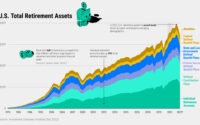Cash will become ‘less useable’ as high street goes contactless, says Bank of England
As cash continues to decline, new, non-bank financial institutions are likely to start issuing private money such as stablecoins – a type of cryptocurrency that are pegged to a central currency – to be used for payments.
The Bank of England is consulting on a digital pound, which would be the anchor for these cryptocurrencies in lieu of cash.
The Bank must keep ahead of the changes so that it does not have to play a difficult game of regulatory catch up, Sir Jon said.
The Financial Services and Markets Bill will give the Bank powers to regulate providers of stablecoins that are used on a large scale in the UK.
The Bank plans to consult later this year with the Financial Conduct Authority on the regulatory framework for how these cryptocurrencies will be issued and transferred.
There will be a risk to financial stability, which means the Bank may need to introduce limits on how stablecoins can be adopted in the initial phases, Mr Cunliffe added.
Separately, the City minister Andrew Griffith announced a new push for Open Banking, a system used by seven million people that allows banks to open up data to secure third parties.
Speaking at the summit, he said: “This will be the year of delivery on the next generation of Open Banking.”
The Government plans to move Open Banking onto a new regulatory framework with high standards of corporate governance this year.
Seven million consumers and three-quarters of a million small and medium sized businesses are using Open Banking products.
Mr Griffith also called on firms to use artificial intelligence to combat fraud and create chatbots to enhance customer service.
He said: “This technology has immense potential to transform the financial services sector.”
[ad_2]
Source link


